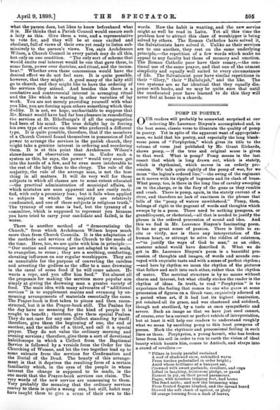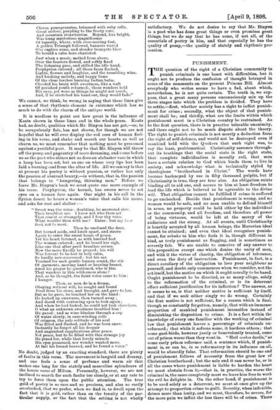POMP IN POETRY.
OUR readers will probably be somewhat surprised at our selecting Mr. Laurence Binyon's accomplished and, in the best sense, classic verse to illustrate the quality of pomp in poetry. Yet in spite of the apparent want of appropriate-
ness, we hold that his poetry, and especially the long blank- verse poem of " Porphyrion," which gives its title to the volume of verse just published by Mr. Grant Richards, shows pomp, — if the true and original sense is given to that word. What is pomp? Pomp means in the last resort that which is long drawn out, which is stately, which is rhythmieal, which moves in an orderly pro- cession. We talk quite rightly of the pomp of war, for we- mean the legion's ordered line,"—the swing of the regiment as it moves with its ripple of bayonets and its clash of brass.- What pomp, too, is there in the long line of cavalry sweeping
on to the charge, or in the fury of the guns as they rumble and crash. There is pomp, again, in the stately current of a river, and therefore no lack of exactness in the phrase that tells of the "pomp of waters unwithstood." Pomp, then, belongs of right to the pageant of words and thoughts which sweeps by in a poem. There need be nothing pompous, or grandiloquent, or rhetorical,—all that is needed to justify the phrase is the ordered procession of sound and idea. And this we find in Mr. Laurence Binyon's fascinating poem.
It has no great sense of passion. There is little to ex- cite or vivify, nor is there any interpretation of the human heart, or attempt to solve the riddles of existence, —"to justify the ways of God to man," as an older, austerer school would have described it. What we do get in Mr. Laurence Binyon's poem is a beautiful pro.
cession of thoughts and images, of words and sounds con- veyed with exquisite taste and with a sense of perfect rhythm; —and here by rhythm we mean the rhythm of the pictures that follow and melt into each other, rather than the rhythm of metre. The metrical structure is by no means without
charm and interest, but what chiefly strikes the reader is the rhythm of ideas. In truth, to read " Porphyrion" is to experience the feeling that comes to one who gazes at some procession of figures on a Greek vase, exquisitely adorned at a period when art, if it had lost its highest inspiration,
yet retained all its grace, and was chastened and subdued, though not sterilised, by a taste at once sympathetic and severe. Such an image as that we have just used cannot,
of course, ever be a correct or perfect vehicle of interpretation, but at least it will help our readers to understand roughly what we mean by ascribing pomp to this least pompous of poems. Mark the rhythmic and processional feeling in such
lines as these. Porphyrion, a young hermit, who has broken loose from his cell in order to run to earth the vision of ideal beauty which haunts him, comes to Antioch, and strays into. a crowd of revellers :—
" Pillars in lovely parallel sustained
A roof of shadowed snow, enkindled warm From torches pedestalled in order bright ; Amid whose brilliance at a banquet sat,
Crowned with sweet garlands, revellers, and cups
Lifted in laughing, boisterous pledge, or gazed Earnest in joy, on their proud paramours.
Pages, with noiseless tripping feet, had borne The feast aside; and now the brimming wine From frosted flagons blushed, and the spread board Showed the soft cheek of apricot, or glory,
Of orange burning from a dusk of leaves, Cloven pomegranates, brimmed with ruby cells, Great melons, purpling to the frosty core, And mountain strawberries. Beyond, less bright, Was hung mysterious magnificence Of tapestry, where, with ever-moving feet, A golden Triumph followed, banners waved O'er captive arms, and slender trumpets blew To herald a calm hero charioted.
Just when a music, melted from above, Over the feasters flowed, and softly fixed The listening gaze, and stilled the idle hand, Porphyrion entered ; all those faces flushed, Lights, flowers and laughter, and the trembling wine, And hushing melody, and happy fume Of the clear torches burning Indian balm, Clouded his brain with sweetness, like a waft Of perished youth returned; those wonders held His eyes, yet were as things he might not touch, And, If he stretched his hand out, they would fade."
We cannot, we think, be wrong in saying that these lines give a sense of that rhythmic element in existence which has so much to do with the charm of the antique world.
It is needless to point out how great is the influence of Keats shown in these lines and in the whole poem. Keats had, no doubt, qualities which Mr. Binyon has not got,—or, to be scrupulously fair, has not shown, for though we are not hopeful that he will ever display the red core of human feel- ing in his verse, and shake and search our hearts as well as charm us, we must remember that nothing must be presumed against a youthful poet. It may be that Mr. Binyon will throw off the pomp and pageantry of mere dreaming, and come before us as the poet who shines not as does an alabaster vase in which a lamp has been set, but as one on whose very lips has been laid a burning coal from the altar of life. All we can say is that at present his poetry is without passion, or rather has only the passion of abstract beanty,—is without, that is, the passion that belongs to "hungering, thirsting men." Before we leave Mr. Binyon's book we must quote one more example of his verse. Porphyrion, the hermit, has sworn never to set eyes on a human face again. One night in his cell in the Syrian desert he hears a woman's voice that calls his name, and asks for rest and shelter :— " Sweet was the voice : doubting, he answered slow.
Thou troublest me. I know not who thou art That com'st so strangely, and I fear thy voice.
What wouldst thou with me ? Enter: but my face Seek not to meet. Then he unclosed the door, But turned aside, and knelt apart, and strove Again to enter the sweet house of peace.
Yet his heart listened, as with hurried feet The woman entered ; and he heard her sigh, Like one that after peril breathes secure.
Now the more fixedly he prayed; his will Was fervent to be lost in holy calm, So hardly new-recovered : but his ear Yearned for each gentle human sound, the stir Of garments, moving hand or heaving breast.
Amid his prayer he questioned, who is this
That wanders in this wilderness alone ?
And, as he thought, the faint voice came to him : I hunger. Then, as men do in a dream, Obeying without will, he sought and found Food from his store, and brought, and gave to her. But as he gave, he touched her on the hand : He looked up unawares, then turned away ; And dared with venturing eyes to look again ; And when he had looked, he could not look elsewhere.
0 what an unknown sweetness troubled him !
He gazed : and as wine blushes through a cup Of water slowly, in sure-winding coils Of crimson, the pale solitude of his soul Was filled and flushed, and he was born anew.
Instantly he forgot all his despair And anguished supplications after peace.
Not peace, but to be filled with this strange joy He pined for, while that lovely miracle His eyes possessed, nor wonder wanted more.
At last his breast heaved, and he found a voice."
No doubt, judged by an exacting standard, there are plenty of faults in this verse. The movement is languid and dreamy, and one feels a sense of perfume and warm air that makes one long for the stately and masculine splendours of the heroic verse of Milton. Personally, however, we are not inclined to search for such faults too closely, or at any rate to
try to force them upon the public attention. The true gold of poetry is so rare and so precious, and also so easily overlooked, that we prefer, when we find it, to dwell upon the fact that it is gold, rather than on the tenuity of the par- ticular supply, or the fact that the setting is not wholly
satisfactory. We do not desire to say that Mr. Binyon is a poet who has done great things or even promises great things, but we do say that he has some, if not all, of the essentials of poetry in him, and that especially he has the quality of pomp,—the quality of stately and rhythmic pro- cession.



































 Previous page
Previous page